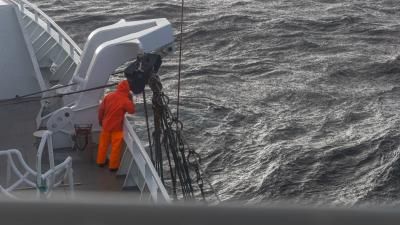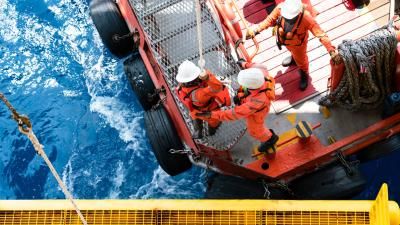
New technologies to improve health and safety performance
Discovering Safety joins forces with Safetytech Accelerator to build a Smarter Regulation Sandbox.
This page is approximately a 4 minute read
This page was published on

According to Lloyd’s Register Foundation’s latest World Risk Poll Focus On report, Risk perceptions and experiences of ocean workers, ocean workers are among one of the most vulnerable demographics in the face of climate change, with 80% of them saying they are worried about being seriously harmed by severe weather.
The report is based on new analysis of data from the 2024 World Risk Poll, powered by Gallup, which surveyed 147,000 people across 142 countries.
When asked what the greatest source of risk to their safety in daily life is, ocean workers were almost three times as likely to name climate change as workers across other industries (17%, compared to 6%).
Lloyd’s Register Foundation also found that ocean workers have experienced more harm from severe weather than any other group of workers. One third (33%) of ocean workers reported having personally experienced serious harm from severe weather in the last two years, compared to 20% of other workers. These statistics reflect the fact that, unlike many in the general workforce, ocean workers face direct exposure to the increasing intensity of severe weather events, from storms to unpredictable ocean conditions.
The report further highlights ocean workers as an already vulnerable demographic, and found they have the highest personal experience of workplace harm compared with other sectors. A quarter (25%) of ocean workers reported experiencing harm from their work in the past two years, compared to 18% of other workers.
Worryingly, despite high rates of harm, too few ocean workers have received occupational safety and health (OSH) training. Over two thirds (68%) of ocean workers said they never have, while only a quarter (25%) have received recent training (in the last two years).
With evidence that ocean workers face the most harm from climate change and do not have sufficient OSH training, the Foundation is calling for ocean workers to be acknowledged as frontline workers when it comes to climate change.
Nancy Hey, Director of Evidence and Insight at Lloyd’s Register Foundation, said: “Climate change is undeniably reshaping our world, leading to more frequent, and more severe weather events. While this will impact us all, there are sectors of the global workforce which feel its impacts more severely. That makes it all the more concerning that those same workers are not receiving the vital OSH training they need to keep themselves, and their colleagues, safe.”
The Foundation is now calling on governments and stakeholders in ocean industries to ensure that national and international climate adaptation policies include specific provisions for the safety and wellbeing of ocean workers.
Hey added: “It is imperative that we prioritise OSH training for ocean workers and change the assumption that this must only be done once. Training is a continuous process, not a one-off event, which requires adequate funding and widespread industry support.
“Stronger safety standards must be tailored to the unique challenges of working on, or near, the water, including protections against severe weather and isolation-related stress. Without them, ocean workers, who play such a pivotal role in our global economy, will be at increasingly heightened risk as our climate continues to change.”
“However, their frontline status means ocean workers will also have knowledge and expertise on how we can safely adapt to climate change, and this is learning we should look to draw on in other sectors as they are also put under increasing climate-related stress.”
Professor Maximo Q. Mejia, Jr., President of the World Maritime University, said: “Seafaring and commercial fishing have traditionally been recognised as the world’s most hazardous occupations. Aside from already challenging conditions that have perennially been associated with shipboard life, our ocean workers face new and even more serious risks brought about by climate change. The World Risk Poll provides us with important and updated data and evidence that should inform any policy designed to protect not only our ocean workers, but the planet itself.”
Chirag Bahri, International Operations Manager at the International Seafarers Welfare and Assistance Network (ISWAN), and a former seafarer, commented: “In addition to the harsh weather, ocean workers have to deal with a variety of internal issues which lead to anxiety and stress, such as loneliness, working with a diverse and international crew, and being physically separated from their loved ones. This study emphasises that ocean workers are also subject to quiet storms in the form of insufficient training and fear of job loss. Their wellbeing is just as important as the work they do, so they should receive better training that helps to promote their occupational health and safety. The global economy depends on their resilience and power, and in order to safeguard the environment and humanity, we must adopt sustainable solutions.”
